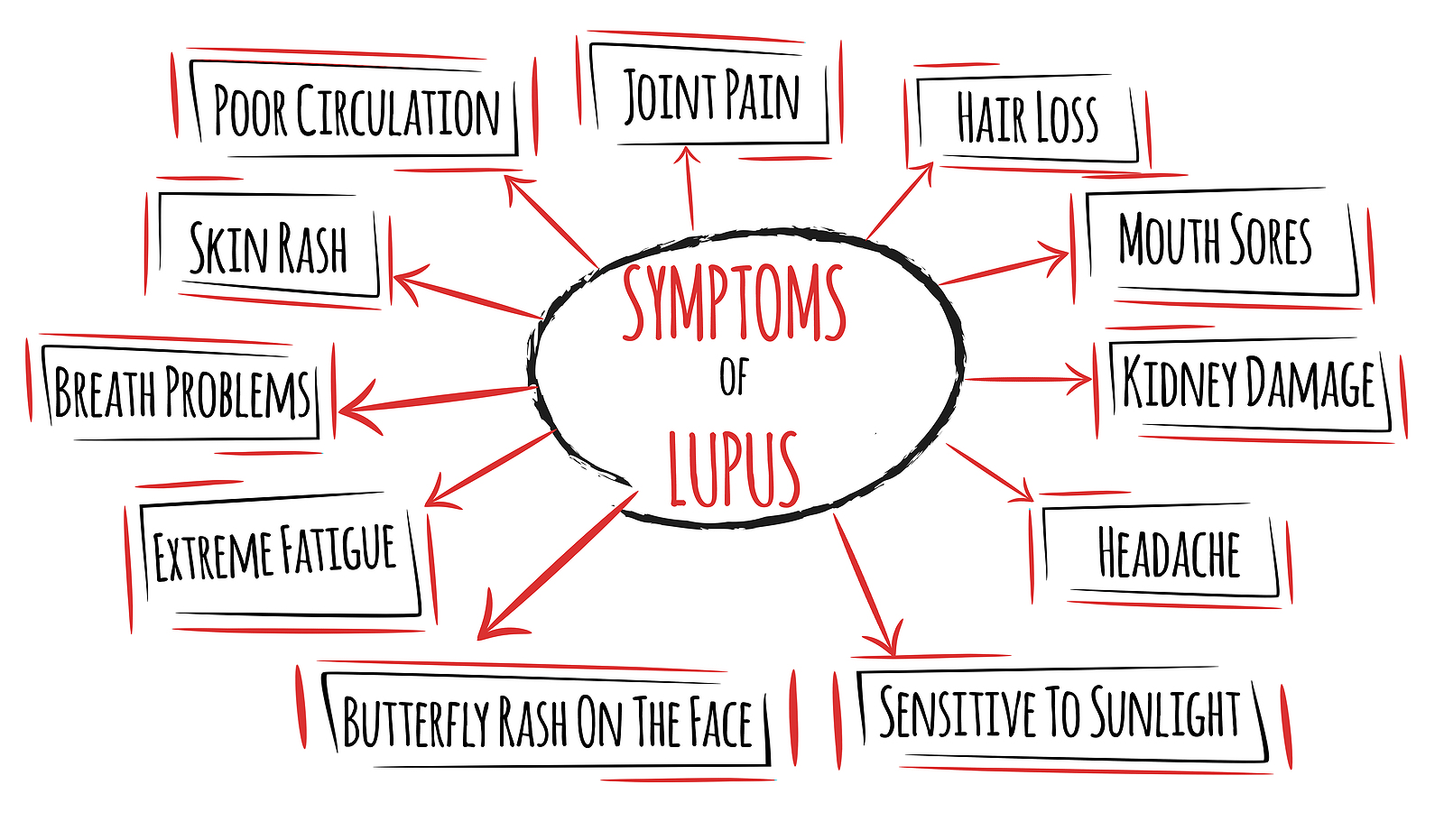
Lupus is an autoimmune disease that can affect different parts of the body. The signs and symptoms of lupus vary from person to person and can range from mild to life-threatening. The symptoms can affect any part of the body. Women are more likely than men to get lupus, and there is no definitive treatment for it.
What is Lupus?
Lupus is a disease in which the immune system of your body assaults your own tissues and organs (autoimmune disease). Lupus can induce inflammation in a variety of physiological systems, including the joints, skin, kidneys, blood cells, brain, heart, and lungs. Lupus is difficult to diagnose since its symptoms and signs are often similar to those of other illnesses. The most distinguishing symptom of lupus is a face rash that looks like butterfly wings unfolding over both cheeks. This rash appears in many but not all cases of lupus. (Mayo Clinic, 2021)
Signs and Symptoms of Lupus
The most prevalent lupus symptoms which affect both men and women are extreme exhaustion (feeling tired all the time), swelling or pain in the joints, and swelling in the hands, feet, or around the eyes is also a common symptom. Headaches, low-grade fevers, sunlight or fluorescent light sensitivity and chest pain when inhaling deeply. Many patients with lupus also suffer from skin and hair issues, such as a rash in the shape of a butterfly on the cheeks and nose, hair loss and sores in the mouth or nose. Another symptom can be when a person is cold or agitated, their fingers and toes turn white or blue and feel numb (Raynaud’s Disease). (Lupus Foundation of America)
Lupus in Women
Lupus is most common in women between the ages of 15 and 44, or throughout their reproductive years. You’re more likely to develop other health concerns if you have lupus. In comparison to women who do not have lupus, lupus can cause problems including renal disease, heart disease, and osteoporosis to develop sooner in life. (Centers for Disease Control and Prevention)
Treatment of Lupus
Your lupus treatment will be determined by a number of factors, including your age, overall health, medical history, which body parts are affected, and the severity of your condition. Because lupus can alter over time, it’s critical to see a doctor on a frequent basis, preferably a rheumatologist. Some patients with minor symptoms do not require therapy. More significant symptoms, such as kidney difficulties, may necessitate the use of strong drug therapy. Drugs that treat lupus include Benlysta (belimumab), CellCept (mycophenolate mofetil), Cytoxan (cyclophosphamide), Imuran (azathioprine), Plaquenil (hydroxychloroquine), Rheumatrex (methotrexate), Rituxan (rituximab) and steroids. Alternative treatments include vitamins and supplements, acupuncture, mind-body therapy and Dehydroepiandrosterone (DHEA). (WebMD)
Doctors that Treat Lupus
Because most individuals with lupus see a variety of experts, it’s a good idea to learn about the many sorts of specialists who might be involved in your comprehensive medical treatment. Rheumatologists are usually the ones who treat lupus. Rheumatologists are internists or pediatrics who specialize in the diagnosis and treatment of arthritis and other joint, muscle, and bone illnesses, as well as autoimmune diseases such as rheumatoid arthritis. Most of the time, you’ll be surrounded by a team of doctors and therapists who will help you manage your disease’s symptoms as well as its limits. (Jewett-Tennant, 2021)
Considering the wide range of symptoms, lupus requires special treatment as per the symptoms and has no cure of its own. Early diagnosis and treatment are essential for preventing serious damage to the organs. If you think you may have lupus, it’s important to see a doctor who specializes in treating the condition. With proper treatment, many people with lupus are able to lead normal, healthy lives.
Works Cited
“Lupus.” Mayo Clinic, Mayo Foundation for Medical Education and Research, 27 Jan. 2021, www.mayoclinic.org/diseases-conditions/lupus/symptoms-causes/syc-20365789#:~:text=Lupus%20is%20a%20disease%20that,%2C%20brain%2C%20heart%20and%20lungs.
“Lupus Symptoms.” Lupus Foundation of America, www.lupus.org/resources/common-symptoms-of-lupus.
“Lupus in Women.” Centers for Disease Control and Prevention, Centers for Disease Control and Prevention, 17 Oct. 2018, www.cdc.gov/lupus/basics/women.htm#:~:text=Women%20with%20lupus%20may%20be,women%20of%20the%20same%20age.
“Lupus: Symptoms, Causes, Complications, and Treatment.” WebMD, WebMD, www.webmd.com/lupus/arthritis-lupus.
Jeri Jewett-Tennant, MPH. “The Types of Doctors and Specialists That Can Treat Lupus.” Verywell Health, Verywell Health, 21 Sept. 2021, www.verywellhealth.com/what-kind-of-doctor-treats-lupus-2249937.





